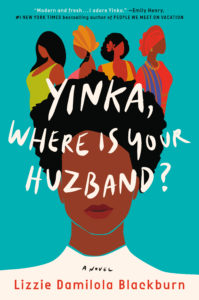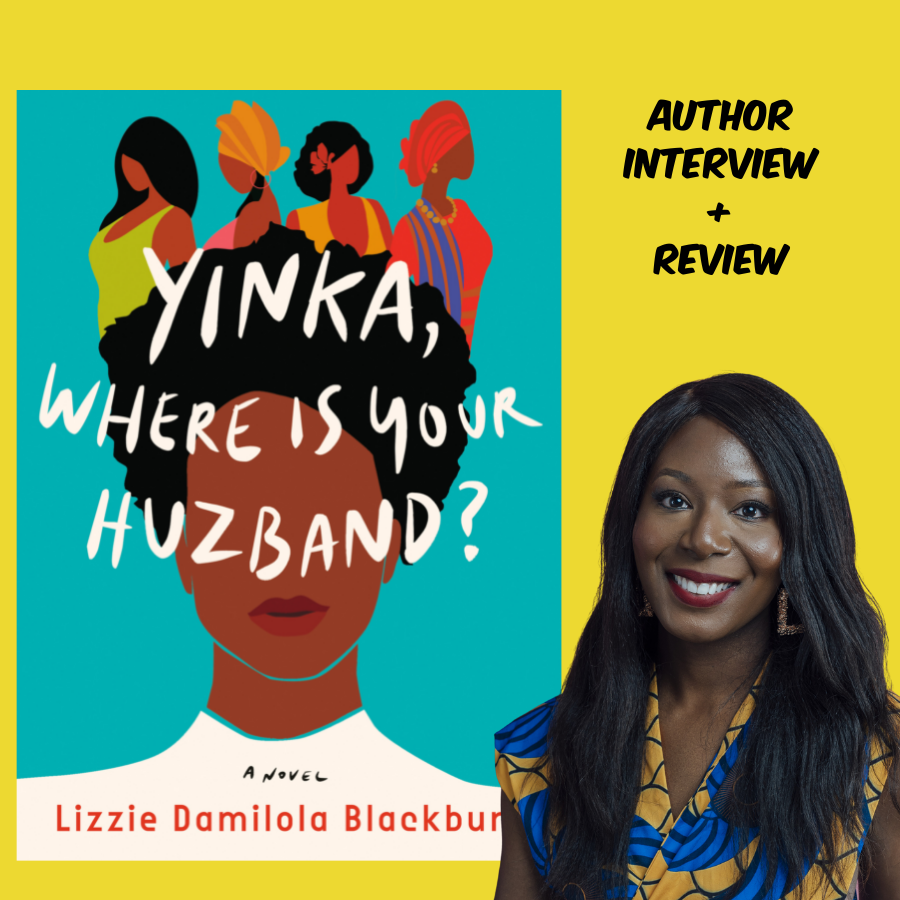Book Review
Yinka, Where is your Huzband? is such a delightful read! Set in South London, Yinka is a woman in her 30s who is still unmarried. Her British-Nigerian family is constantly asking about the whereabouts of her huzband, even going to such lengths as to praying publicly for her to find one. Yinka, annoyed by the pressure, sets a goal of trying to find a date for her cousin’s wedding in the summer. We follow Yinka as she navigates the 30+ dating scene, struggling between making compromises of who she thinks she’s supposed to be and staying true to herself.
I don’t have a lot in common with Yinka: I’m not British, or Nigerian, or connected to Christianity as she is. However, I felt deeply connected to her in ways that are difficult to explain. This story is very light in tone and funny in all the right places, but there is just an undercurrent that is so universal, so very human. It’s the need to be loved and accepted for who you are.
One thing I do have in common with Yinka is that pesky question. People often ask me where is my huzband, either in explicitly or implicitly. But I also saw myself in Nana, Yinka’s best friend, trying to stay true to myself above the noise of society. I saw myself in Donovan, battling with my relationship with God when Christianity is so ingrained in Black culture all over the diaspora. I saw parts of myself in everyone because the story felt that universal.
Falling in love is an enticing story. There are antics and nuance in the dating scene we all laugh at because we have seen before. But then there is the serious, and oftentimes messy, work of working to fall in love with yourself.

Author interview
In addition to reading the book, I had the immense pleasure of sitting down with the author of Yinka, Where is your Huzband?, Lizzie Damilola Blackburn. Below is a transcript of our conversation.
TS: How challenging was it to get your story accepted while being unapologetically Nigerian?
LDB: So I was quite lucky because I went through an unconventional route to publishing. I actually met my amazing agent when I won The Literary Consultancy Pen Factor competition back in 2019 because she was part of the panel. So I didn’t have to submit to agents. The great thing about my agent is that she is a biracial woman, who identifies as Black, and she’s a Christian as well, so she absolutely got the book, and she championed it from the very get go. But either way I didn’t have a full manuscript, so because she got it, she was able to really sell it to the publishers. But to be fair I think even the editors that I worked with got it as well, and they saw how the story of a Black woman who was kind of struggling to find love is quite universal, as well. Lots of people have gone through the same thing or are going through it as well. So I have been very lucky to have people on my side that actually get the story.
TS: In what ways do you feel like Yinka challenges or supports feminism?
LDB: I feel Yinka sticks to her principles of saving herself for marriage. I think that’s quite feminist by being true to who you are and not allowing society to make you feel less than or change your views on things. In that vein, I think she’s a feminist. In some ways she isn’t is that she really struggles with her self worth, especially when you compare her to Nana, who’s more confident in her skin and she embraces who she is. With Yinka, she feels like she has to kind of change herself in order for her to find love. She feels like men want this light-skinned woman with long hair down to their bum and big asses. And she kind of falls into that trap of thinking that she has to be that way. In that vein, she’s not being a true feminist because she is conforming herself into what she thinks that a man wants. But thankfully, she gets to a point where she realizes she needs to be true to herself.
TS: Yinka is entertaining, as it is a piece critical of several social phenomena like colorism, religion, family, culture etc. How did you find balance between serious commentary and light-hearted fun?
LDB: I knew I wanted to write a fun, funny book that would be an easy read, and a very accessible book as well, so even for those who don’t read as often would actually go and read it. But at the same time, I wanted to make sure there was that substance. It was a case of just editing and editing and editing because I think initially I was doing a lot of telling. You know, sometimes when you read a book and you can hear the author trying to get a message through? I was doing a bit of that. Especially when it came to the discussion on colorism with the therapist. My editors were really really good at pushing me to see “these are the areas where it feels like you’re coming through and strip that back”, and let the characters speak for themselves. I found that doing that lightly is better because the readers are smart, and they will pick up on things, and they might even pick up on things I haven’t even realized I put in there. It was a case of refining and editing to get that balance.
TS: Yinka gives me big Insecure vibes (and I love the subtle shoutout to the show)! Could you see Yinka becoming a television series, and if so, who would you want to see casted?
LDB: I can’t say much about it, but if it was made into a TV series, I think for Donovan, I like John Boyega, I think they have similar hairstyles with the cornrows. I think he would do a perfect job bringing out Donovan’s charm and charisma, but also his softer side as well. I think for Nana, Michaela Coel because Michaela is like her own person, and I think she would do a great job bringing out Nana’s effortless and cool, and she’s quite laid back as well. In terms of Yinka, I have no idea. If anything, when I was writing certain scenes, and when I was stuck, I would think of Issa Rae. Issa Rae, like Yinka, is very awkward, so I would try to think of her facial expressions and body language to help me with descriptions. But I would prefer if someone was Black British to play Yinka.
TS: How did it feel to portray Christianity and deep connection to spirituality in a romance?
LDB: I am a Christian, and I know my personal relationship with God is very intimate and personal. I kind of felt like society doesn’t always get to see that. I feel like Christianity is portrayed like old-fashion, or Christians are portrayed as judgemental, and I wanted Yinka to show a different side to Christianity where it is more so about her relationship with God. I didn’t want her to be perfect because we all screw up, but I wanted to show the intimacy of her relationship with Christ. I loved that she didn’t shove it in people’s faces. She only talked about her experience. But it was a great experience and personal as well.
TS: How did writing this story change you?
LDB: I think it made me think about reflection for myself. How am I internalizing what I see in the media or on social media and am I letting all those messages define who I am as a woman? It made me look into that. I did a bit of self reflection. Also it changed my life as well. I’m so glad that God planted this story in my heart. I’m so glad I wrote it. I feel like it will help so many people out there. Just even knowing the impact I have on people’s lives, especially Black women’s lives, is just so humbling.
TS: How are you adjusting to the reception of the book and the impact that it has had on people?
LDB: The book community is so supportive. They just love Yinka. I have direct messages saying “Thank you so much for writing this book, “I feel seen,” “I’m in Yinka’s shoes,” “Thanks so much for sharing her journey. Now I feel like my relationship status doesn’t define me.” Seeing how some readers have loved it because of the story, and how other readers can relate to it on a personal connection to it as well. I feel really blessed and honored. Literally every day I wake up and thank God this book actually helps people and influences the culture as well.
TS: How do you feel like books and the book community has on changing the world?
LDB: I think they do have an impact because they are the readers ultimately, so when a book receives a lot of buzz and a lot of hype, everyone jumps on that, but I know there are some stories that don’t have the same attention, but they are well written, they are just as good, sometimes even better. I don’t know how we do it, but if there is a way for all books to get the same level of attention, though I know some books are published by smaller publishers and don’t have the same resources. I don’t know if it should be us as the readers to go support all authors, but look at independent and self-published books as well because there are a lot of gems in them as well.
TS: What are the books that really impacted you in your life or a book that you are reading currently that really touched you.
LDB: I’ve read this book that’s going to be published this April. It’s called Hope and Glory by Jendella Benson. It’s also set in Peckham as well. It’s about this Black British woman who comes back to the UK after spending some time in LA because her dad has passed. But then she comes home to a lot of family drama. Her brother is in prison and her mom has had a nervous breakdown, and now she has to put her family back together. And the reason why I love the book so much is because I felt like one of the things that she touched on, I felt like I lived through it or I could relate to the experiences. Especially growing up and your upbringing has dysfunction at times. I loved how she touched on that, and it’s just so well written. Very beautiful. I did cry at the end as well. I highly recommend it. Hope and Glory which is out April this year.
TS: Anything else you would like to share about the story?
LDB: I guess the main message of Yinka, Where is your Huzband? is self-love is the most important love of all, and you can’t really enter a relationship if you don’t really love yourself. Because how are you going to love another person properly? Also, I just want people to realize that if they are single or they’re not married, that doesn’t define who they are. They are so much more than their relationship status. Don’t let social media or friends pressure you for feeling less than.


